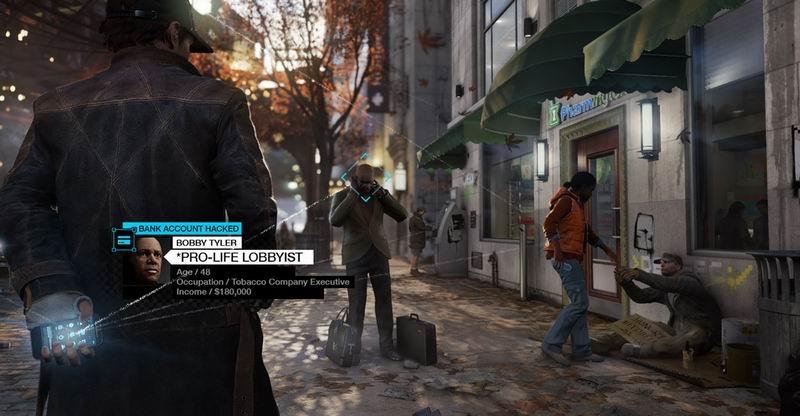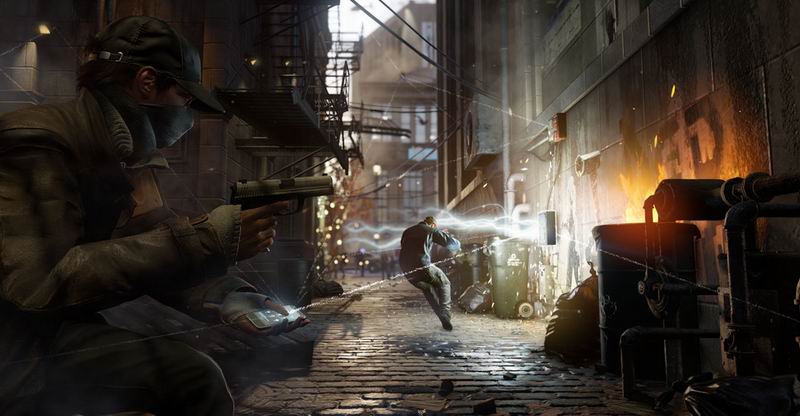Watch Dogs | reviews, news & interviews
Watch Dogs
Watch Dogs
Hacking a grim Chicago in this morally confused action-adventure

Heralded as the first true "next-generation" videogame, Watch Dogs has either been hugely overhyped or the imaginative leap required for a true new generation of videogaming is entirely absent from mainstream games. Because this cyberpunk-inflected hacking action-adventure offers virtually nothing new.
The original Deus Ex in 2000 remains the template for combining dystopian science fiction themes, multi-angled approaches to missions and cyberpunk human augmentation and hacking. This simply attempts to mix that formula with the huge open world and freeroaming chaos of Grand Theft Auto V and parkour and stealth elements taken liberally from other Ubisoft games – most notably Assassin's Creed, Splinter Cell and Far Cry.
 In Watch Dogs you play a gruff and baseball-capped manchild – stereotypically angry about people out to hurt his family, because of what he's done. Aiden Pearce is not likeable – and neither are most of the people he comes up against. But he is armed with one very exciting ability.
In Watch Dogs you play a gruff and baseball-capped manchild – stereotypically angry about people out to hurt his family, because of what he's done. Aiden Pearce is not likeable – and neither are most of the people he comes up against. But he is armed with one very exciting ability.
Just by pulling out a phone and hitting one button, Aiden can hack into just about anything he can see. He can steal cash from passersby, and see their secrets ‑ the game throws up random facts about everyone you pass. But seeing as the passersby are so much digital noise, it doesn't serve to humanise them. He can also raise road bridges, and switch traffic lights, or take over CCTV camera feeds, or cause conveniently-placed steam vents to explode.
 When this is applied to game missions and the side quests available all over the map of Chicago Aiden roams, this can be brilliant. Instead of sneaking into a heavily-guarded data fortress, simply stand outside and chain from camera to camera until you're in the server room. Or during a police car chase, escape by raising pedestrian bollards just after your car passes.
When this is applied to game missions and the side quests available all over the map of Chicago Aiden roams, this can be brilliant. Instead of sneaking into a heavily-guarded data fortress, simply stand outside and chain from camera to camera until you're in the server room. Or during a police car chase, escape by raising pedestrian bollards just after your car passes.
Far too often though, the game hobbles these options – with missions that require stealth, or need you to physically go somewhere. And the rest of the time, Watch Dogs displays a curious approach to the morality of its hacker anti-hero.
On one hand you're dubbed "The Vigilante" and frequent pop-up missions encourage you to stop crimes you have intel on that are about to be committed. But at the same time, it's apparently OK to syphon the bank account of a cancer sufferer in remission randomly on the street, use your car to mow down pedestrians and engage in (admittedly thrilling) high-explosive gun battles with scores of innocent casualties?
Trying to nit moral fibre in among the freeroaming fun has clearly been too hard. The result instead is jarring, dehumanising of most of the city's population and often, a bit dull.
Watch Dogs may be slickly produced and may look great, it may even have one of the best and simplest videogame "power ups" in its hacking. But the dialogue and plotting are excrable, thematically it's chaotic and confused and all too often, most cyber-criminally, it gives you powers and then doesn't really know what to do with you once you have them.
- Watch Dogs is out now for PC, PS3, PS4, Xbox One, Xbox 360 (version tested, PS4). Developed by Ubisoft Montreal and published by Ubisoft.
- Read other gaming reviews on theartsdesk
- Simon Munk on Twitter
The future of Arts Journalism
You can stop theartsdesk.com closing!
We urgently need financing to survive. Our fundraising drive has thus far raised £49,000 but we need to reach £100,000 or we will be forced to close. Please contribute here: https://gofund.me/c3f6033d
And if you can forward this information to anyone who might assist, we’d be grateful.

Subscribe to theartsdesk.com
Thank you for continuing to read our work on theartsdesk.com. For unlimited access to every article in its entirety, including our archive of more than 15,000 pieces, we're asking for £5 per month or £40 per year. We feel it's a very good deal, and hope you do too.
To take a subscription now simply click here.
And if you're looking for that extra gift for a friend or family member, why not treat them to a theartsdesk.com gift subscription?
more Gaming
 'We are bowled over!' Thank you for your messages of love and support
Much-appreciated words of commendation from readers and the cultural community
'We are bowled over!' Thank you for your messages of love and support
Much-appreciated words of commendation from readers and the cultural community
 Kelly Clancy: Playing with Reality - How Games Shape Our World review - how far games go back
The acclaimed neuroscientist on the world and history of games, in all their variety
Kelly Clancy: Playing with Reality - How Games Shape Our World review - how far games go back
The acclaimed neuroscientist on the world and history of games, in all their variety
 Rage 2 review – garish but great post-apocalyptic shooter
Challenge The Authority in this 'Mad Max on mushrooms' renegade romp
Rage 2 review – garish but great post-apocalyptic shooter
Challenge The Authority in this 'Mad Max on mushrooms' renegade romp
 World War Z review - bloodthirsty fun with the zombie apocalypse
Chainsawing the brain-eaters as you battle against the tide of the undead
World War Z review - bloodthirsty fun with the zombie apocalypse
Chainsawing the brain-eaters as you battle against the tide of the undead
 The Lego Movie 2 Videogame review - everything is not awesome
Few fresh ideas means this movie adaptation treads the same old ground
The Lego Movie 2 Videogame review - everything is not awesome
Few fresh ideas means this movie adaptation treads the same old ground
 Anthem review - singing praises? More like a cautious nod
A rocky start for a new franchise that offers potential and problems in equal measure
Anthem review - singing praises? More like a cautious nod
A rocky start for a new franchise that offers potential and problems in equal measure
 Crackdown 3 review - spectacular super-powered action that was great fun many years ago
Nearly a decade has passed since the last incarnation but little has changed in this stagnant shooter
Crackdown 3 review - spectacular super-powered action that was great fun many years ago
Nearly a decade has passed since the last incarnation but little has changed in this stagnant shooter
 Battlefield V review - WWII on an epic scale
The veteran series returns for another ambitious tour of duty
Battlefield V review - WWII on an epic scale
The veteran series returns for another ambitious tour of duty
 Fallout 76 review - how to wreck a perfectly good legacy with one messy game
When home runs go horribly wrong
Fallout 76 review - how to wreck a perfectly good legacy with one messy game
When home runs go horribly wrong
 Red Dead Redemption 2 review - the cowboy drama makes a triumphant return
An ambitious Wild West odyssey that matches epic scale with benchmark skill
Red Dead Redemption 2 review - the cowboy drama makes a triumphant return
An ambitious Wild West odyssey that matches epic scale with benchmark skill
 Call of Duty: Black Ops 4 review – less is more
Solo rations have been relegated from this benchmark war series
Call of Duty: Black Ops 4 review – less is more
Solo rations have been relegated from this benchmark war series
 FIFA 19 review - the best just got a bit better
It looks and plays great, but what’s new?
FIFA 19 review - the best just got a bit better
It looks and plays great, but what’s new?

Add comment